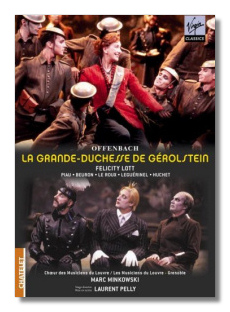
The Internet's Premier Classical Music Source
Related Links
- Offenbach Reviews
- Latest Reviews
- More Reviews
-
By Composer
-
Collections
DVD & Blu-ray
Books
Concert Reviews
Articles/Interviews
Software
Audio
Search Amazon
Recommended Links
Site News
 DVD Review
DVD Review
Jacques Offenbach

La Grande-Duchesse de Gérolstein
- Felicity Lott (La Grande-Duchesse)
- Yann Beuron (Fritz)
- Sandrine Piau (Wanda)
- François Le Roux (Boum)
- Eric Huchet (Paul)
- Franck Leguérinel (Puck)
Choeur des Musiciens de Louvre
Les Musiciens de Louvre – Grenoble/Marc Minkowski
Virgin Classics 310239-9 2DVDs 154min
This is a La Grande-Duchesse to the fourth power. I grew up on Régine Crespin's recording of this operetta (Sony Classical SM2K62583), but never felt the second and third acts added up to much, except for the melodies, which are undoubtedly fetching. La Grande-Duchesse, like many other operettas and musicals, has been arranged, cut, and rearranged since its première in 1867. The production presented here, staged in the Théâtre du Châtelet in Paris in 2004, restores several musical numbers missing from the Crespin recording, which was based on staged performances in Toulouse in the late 1970s. It also adds and modifies quite a lot of dialogue. What we have here is a "critical edition" by Jean-Christophe Keck based on the original. All this new material (new to me, anyway) doesn't make the second two acts of La Grande-Duchesse any less creaky, and parts of the show drag a little, but I'm glad that so much good music has been restored. (Actually, some of it was heard on the Crespin recording, but only in the guise of orchestral interludes.)
Stage director Laurent Pelly has filled this production with gimmicks, and these work only about half of the time. For example, when the curtain rises, we see what appears to be a battlefield of dead soldiers in World War One uniforms – the original setting was circa 1720! – but then one of them gets up and pops open a bottle. Everyone "wakes up" and drinks. And what about the wardrobe filled with human skulls? Not very funny, right? Pelly, working with choreographer Laura Scozzi, makes sure that no one is allowed to just stand there and sing. Even chorus members, not generally known for their balletic skills, are asked to do little dances during their numbers. Sometimes this is clever, and sometimes it looks like a high school musical nightmare. Real dancers have been drafted as well. During the scene change in Act Three, there is an incomprehensible pas de deux in front of the curtain for a very small soldier with a bouquet, and a very tall bride… really a man in drag. She manhandles him as other soldiers can-can across the stage. It's funny, but I have no idea what purpose it serves. Pelly's production is full of similar head-scratchers.
Both Minkowski (and his orchestra) and Sandrine Piau are associated with early music, so it is interesting to hear and see them performing Offenbach. They do it quite well, actually. Minkowski has no problem getting the score to sparkle; in fact, at times he is too frenetic. Piau is adorable in her soubrette role, if not as sparkling as Mady Mesplé was on the earlier recording. Beuron is a good comedian, and vocally he has everything that the role of Fritz – which is rather difficult, because it is written so high - needs. He's not as comfortable as Alain Vanzo, however. As the pompous General Boum, a darker voice is needed than François Le Roux's. Eric Huchot's Prince Paul is well sung, but his makeup is grotesque. The same can be said of the Baron Puck, Franck Leguérinel. Maybe it looked better from a distance.
Arguably, Régine Crespin was too old for the title role in the late 1970s. Her voice was a little strained, but she had plenty of charisma. Felicity Lott also is too old for this role, but she carries on like a spoiled teenager, and the effect is bizarre. (Pelly seems to have encouraged his principals to pull as many faces as possible. This might have been fine in the theater, but on TV it looks overdone.) The enthusiastic Lott is in better voice than Crespin was, but she's not nearly as chic, and her sometimes suspect French pronunciation sticks out in a cast of native Francophones. I suspect that the original Grande-Duchesse's storied physical beauty compensated for the character's weird behavior. With Lott (and also with Crespin), one feels like one is watching a relative of Mame.
Act One is on the first DVD, and the remaining two acts are on the second. The English subtitles are abundant and appropriate. Sound and picture quality are first-class. The "booklet" is nothing more than a fold-over with photos and a listing of the cast and credits. An essay about this new production and the unfamiliar materials would have been welcome. Oh well. This is an entertaining production of one of Offenbach's most tuneful scores. Consider yourself warned, though, that it's just a bit too clever for its own good.
Copyright © 2006, Raymond Tuttle




















